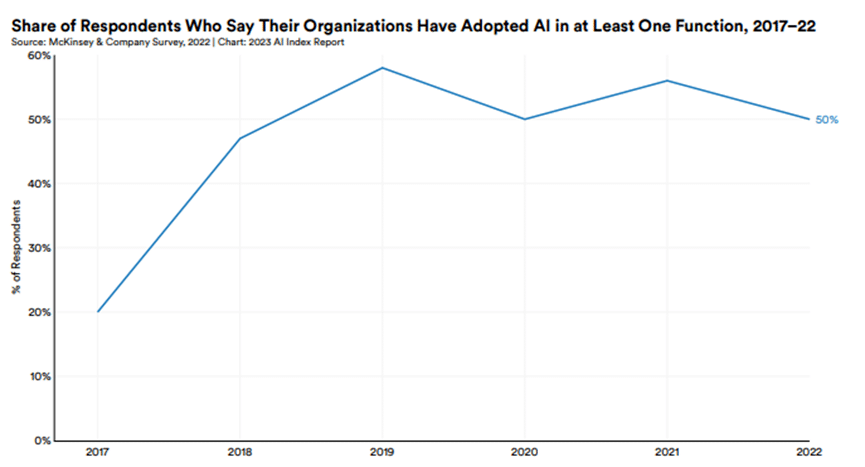Excerpts from the Stanford 2023 AI Index Report Insights

The Stanford Artificial Intelligence Index Report (AI Index Report) is an annual
report published by Stanford Human -Centered Artificial Intelligence to track,
organize, refine, and visualize data related to artificial intelligence. The report
covers various aspects of AI research and development, technology performance,
policy, and public attitudes.
Main points of the report
1. Industry leads academia
Prior to 2014, most
important machine learning models were released by academia, but since then industry
has gradually taken over. In 2022, industry released 32 important machine learning
models, compared to only 3 released by academia. Building state-of-the-art AI
systems requires large amounts of data, computational resources, and funding, which
industry has in abundance compared to nonprofits and academia.
2. AI
has both benefits and drawbacks for the environment
Studies
have shown that AI can be used to improve the environment.
In 2022, Google's
AI company, DeepMind, released the results of an experiment in which DeepMind
trained a reinforcement learning agent called BCOOLER to optimize the cooling
process in Google's data centers. The results showed that at the end of the
three-month experiment, BCOOLER saved about 12.7 percent of energy.
However,
AI systems can also have serious environmental impacts. According to Luccioni et al,
of the four language models, GPT-3, Gopher, OPT, and BLOOM, the GPT-3 training
process had the highest carbon emissions, equivalent to 502 times the carbon
emissions of a one-way flight from New York to San Francisco.
3. AI
publications double in number
Between 2010 and 2021, the total
number of AI-related publications more than doubles, from 200,000 in 2010 to nearly
496,000 in 2021. Publications in pattern recognition and machine learning have grown
the fastest over the past five years.
4. Lower costs and higher
revenues for companies utilizing AI
According to the findings
of McKinsey's annual study, the percentage of companies utilizing AI more than
doubled between 2017 and 2022, stabilizing between 50% and 60%. And, these companies
report realizing significant cost reductions and revenue increases.

5. Policymakers' attention to AI is on the rise
The AI Index
Report analyzed laws containing the term "artificial intelligence" passed by 127
national legislatures between 2016 and 2022. The results show that 31 of the 127
countries have passed at least one AI-related bill, for a total of 123.
6. AI accelerates scientific progress
Artificial
intelligence models are beginning to accelerate scientific progress and will be used
to help hydrogen fusion and improve the efficiency of matrix operations in 2022.
7. Public attitudes towards AI are mixed
In an
IPSOS 2022 survey, 78% of Chinese respondents agreed with the statement that "the
benefits of using AI products outweigh the disadvantages," the highest percentage of
any country surveyed. China was followed by Saudi Arabia (76%) and India (71%),
while only 35% of Americans agreed with the statement, a low percentage among the
countries surveyed.